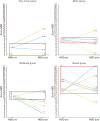Transanal Irrigation for Neurogenic Bowel Dysfunction in Multiple Sclerosis: A Retrospective Study
- PMID: 35362457
- PMCID: PMC8978129
- DOI: 10.5056/jnm19040
Transanal Irrigation for Neurogenic Bowel Dysfunction in Multiple Sclerosis: A Retrospective Study
Abstract
Background/aims: Sixty-eight percent of multiple sclerosis (MS) patients suffer from neurogenic bowel dysfunction (NBD). Transanal irrigation (TAI) is part of the therapeutic strategy. This retrospective study aims to assess the efficacy of TAI in MS population.
Methods: Twenty-eight MS patients who underwent TAI after a learning period were included. We collected several demographic data: MS disease characteristics, treatments, urinary and bowel dysfunction characteristics, urodynamic parameters, results of the NBD score, the Urinary Symptom Profile (USP) score, and the Patient Global Impression of Severity score, completed by patients before the learning and during the follow-up consultation. We defined 4 specific groups depending on the NBD score severity: very minor, minor, moderate, and severe.
Results: Mean follow-up was 124 days, 85.0% were initially constipated and 36% had fecal incontinence. After TAI, improvement of NBD score was higher in initial Moderate NBD score group with 75.0% of patients decreasing their NBD score into lower severity categories. Few modifications were observed for baseline Very minor and Severe NBD score groups with 60.0% and 87.5% of patients staying in the same category. Statistical improvement of USP voiding dysfunction score was observed (95% CI, -6.13--1.19; P = 0.005) without improvement of overactive bladder USP sub-score.
Conclusions: TAI is effective in NBD, especially in MS patients with initial Moderate NBD score. Improvement of voiding dysfunction following TAI confirms the pelvic organ cross-talk and the need to systematically consider and treat bowel dysfunction in MS to also improve urinary symptoms.
Keywords: Lower urinary tract symptoms; Multiple sclerosis; Neurogenic bowel; Therapeutic irrigation.
Conflict of interest statement
Figures


Similar articles
-
The Functional Implications of Transanal Irrigation: Insights from Pathophysiology and Clinical Studies of Neurogenic Bowel Dysfunction.J Clin Med. 2024 Mar 7;13(6):1527. doi: 10.3390/jcm13061527. J Clin Med. 2024. PMID: 38541753 Free PMC article. Review.
-
An open prospective study on the efficacy of Navina Smart, an electronic system for transanal irrigation, in neurogenic bowel dysfunction.PLoS One. 2021 Jan 29;16(1):e0245453. doi: 10.1371/journal.pone.0245453. eCollection 2021. PLoS One. 2021. PMID: 33513187 Free PMC article. Clinical Trial.
-
Effect of sacral neuromodulation on bowel dysfunction in patients with neurogenic bladder.Colorectal Dis. 2020 Dec;22(12):2155-2160. doi: 10.1111/codi.15273. Epub 2020 Aug 5. Colorectal Dis. 2020. PMID: 32681678
-
Long-Term Cost-Effectiveness of Transanal Irrigation in Patients with Neurogenic Bowel Dysfunction.PLoS One. 2016 Aug 24;11(8):e0159394. doi: 10.1371/journal.pone.0159394. eCollection 2016. PLoS One. 2016. PMID: 27557052 Free PMC article.
-
Neurogenic Bowel Dysfunction in Children and Adolescents.J Clin Med. 2021 Apr 13;10(8):1669. doi: 10.3390/jcm10081669. J Clin Med. 2021. PMID: 33924675 Free PMC article. Review.
Cited by
-
Neurogenic Bowel Dysfunction in Patients with Spinal Cord Injury and Multiple Sclerosis-An Updated and Simplified Treatment Algorithm.J Clin Med. 2023 Nov 7;12(22):6971. doi: 10.3390/jcm12226971. J Clin Med. 2023. PMID: 38002586 Free PMC article. Review.
-
The Functional Implications of Transanal Irrigation: Insights from Pathophysiology and Clinical Studies of Neurogenic Bowel Dysfunction.J Clin Med. 2024 Mar 7;13(6):1527. doi: 10.3390/jcm13061527. J Clin Med. 2024. PMID: 38541753 Free PMC article. Review.
References
LinkOut - more resources
Full Text Sources

